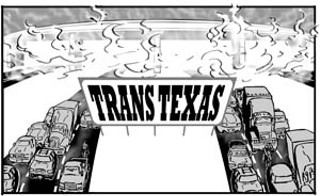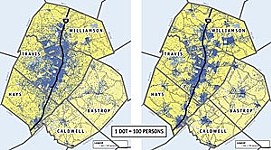Austin @ Large: Highway Ho-Ho-Ho!
As concrete Christmas arrives, who's got the last laugh now?
By Mike Clark-Madison, Fri., Dec. 24, 2004

This column comes with theme music. No, not Christmas music. Hit it, George and Ira:
"They all laughed at Christopher Columbus, when he said the world was round,
They all laughed when Edison recorded sound ...
They all laughed when Perry said he wanted a highway a quarter-mile wide,
They're all laughing, but now they want to take a ride!"
Okay, the Gershwins didn't write that last part. But can't you imagine Sinatra serenading the miracle that is the Trans Texas Corridor? Or maybe Ted Nugent. Or maybe Ric Williamson, who sings his friend Rick Perry's tune at least once a month as chair of the Texas Transportation Commission. At last week's meeting of the governor's glee club, the state pledged its troth to a consortium led by the Spanish transportation conglomerate Cintra (with participation, naturally, from a Texas-based concrete king, H.B. Zachry Construction) to – assuming they come to terms over months, if not years, of negotiation – build the "first leg" of Perry's multi-multi-multi-billion dollar Trans Texas Corridor scheme, a new highway/rail/utility right of way a quarter-mile wide from the Red River to the Rio Grande, paralleling I-35.
But not too closely, or else people might just drive on I-35 like they always have, rather than paying a dime or two a mile in tolls to speed along the TTC-35 route at 85 mph, deliberately avoiding the major cities that grace the I-35 corridor on their way from Here to There. Just passing through, folks. Nothing to see here. Which means, of course, that in order to encourage TTC traffic, the state will have to forget the plans to improve and widen I-35 that it has been promising to citizens for, oh, about three decades.
This development has driven other I-35 cities batshit, or at least into a coalition to aggressively lobby against the corridor. How that's going to affect Austin remains to be seen, because technically State Highway 130 will be our leg of the corridor, and it's already being built by a consortium led by Fluor (who came in last in the three-way race for this initial TTC-35 contract), and everyone strenuously denies that SH 130's toll-road needs will goad TxDOT into shelving its I-35 plans through Central Austin. Which many citizens would not exactly cry about, but there's a right way and a wrong way to make these decisions. I'm not sure building an even bigger river of concrete somewhere else should smell like a victory.
Pipe-Dream Economics
Now, some of you are probably grumbling that, really, I must like the Trans Texas Corridor, because I didn't object to (most of) the Central Texas Regional Mobility Authority's recent toll road plan, and earlier lent my (admittedly qualified) backing to SH 130. Feh, I say. If that's the level of sophistication we're bringing to civic discourse these days, we should all take up knitting.
Heretofore, all we've needed to say about the corridor is that it's to be a quarter-mile wide. In other words, it's a retrograde exercise in concrete brutality, the kind of unworthy endeavor you would have thought died with Robert Moses if not Le Corbusier, a bridge to the mid-20th century. And we're not talking about the Golden Gate Bridge here, or some other admirable triumph of the engineering art. We're just talking about a lot of money.
But now that the money is blowing about, let's go further. As far as I can tell, the Trans Texas Corridor will meet not one single everyday human need. The millions of citizens along the urbanized I-35 corridor get the shaft. The rural residents along the TTC-35 route also get the shaft. Even the contractors and highway hos could just as easily get rich building other things – like, say, effective inter-city passenger rail service, or (horrors!) dense urban development that would take commuter traffic off I-35. That leaves the big manufacturers and shippers who, I thought, were too concerned about price competition to willingly add to the cost of their goods.
But to its fans, the beauty of the Trans Texas Corridor is that it's "market-based," or "semi-privatized" – or whored out, or however you like to describe such things. In other words, OPM. Please. If this were truly so, the state would not need to be involved at all. As soon as the first eminent-domain proceeding gets filed to take some sorghum farmer's back 40, the magic of the market collapses, at least philosophically. The real fiscal collapse might take a little longer.
If Rick Perry and his posse really think that even the TTC-35 segment, let alone the other thousands of miles of corridor envisioned to connect hither with yon, represents a new way to get lots of expensive infrastructure without paying for it, there must be some fine green growing in the flower beds at the Governor's Mansion. The nowhere-to-nowhere model of highway planning exists in other locales, and some of these roads are operated by quasi-private toll concessionaires. But the gap between the positive outcome presumed, or wished, for the Trans Texas Corridor, and the actual market demand for this infrastructure, is at least a quarter-mile wide. If you want to build a big socialist public-works concrete extravaganza, then build one. If you want the private sector to build roads for you, then accept those roads in the locations and specifications the private sector feels appropriate. There's no mix-and-match option here.
Looking for Allies
This fact is easy to miss when focusing on the I-35 corridor, where that gap may be a bit less yawning. But that doesn't make this a good idea. I've whined a lot that the biggest cost of sprawl is the opportunity cost – the value of the things we didn't, or now can't, do with the land and the money trampled under the path of least resistance. The Trans Texas Corridor is just not a very good investment of resources we can better use doing something else.
This highlights a need for a real progressive strategy for dealing with roads – beyond saying they all suck. This does little to help the multitudes who are not fiscally or physically fortunate enough to afford central-city housing or get to work by human-powered transport. It also prompts the Other Side into taking the binary position, wrapping itself around the most ridiculous ideas like the Trans Texas Corridor, because after all, the only people who don't like roads are those crazy hippies.
Obviously that's not true in this case, but progressives are ill-served having to rely on, say, the Texas Farm Bureau to bail them out. A better, more sustainable alliance would be – duh! – with the other urbanites along I-35, such as Dallas Mayor Laura Miller, who have little use for either the corridor or Perry and Ric Williamson, and (in Miller's case) have little political impetus not to say so. Miller's been tapped as a potential statewide candidate in 2006, which hints at a salient point: Whoever carries the Dem banner against the winner of the Rick-and-Kay-and-Carole cage match needs to be running against the Trans Texas Corridor and the highway ho-ho-hos. Who's got the last laugh now?
Got something to say on the subject? Send a letter to the editor.









